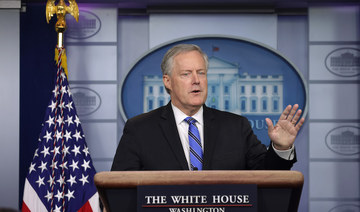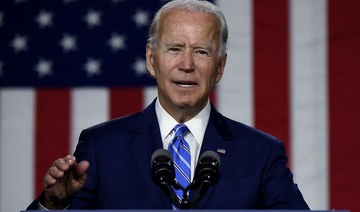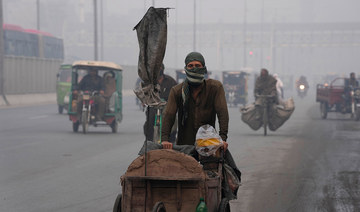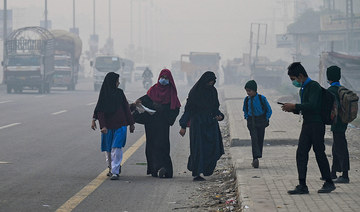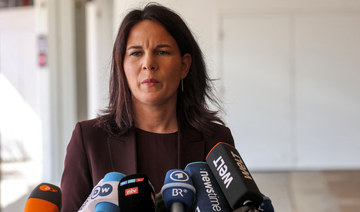WASHINGTON: US intelligence officials believe that Russia is using a variety of measures to denigrate Democratic presidential candidate Joe Biden ahead of the November election and that individuals linked to the Kremlin are boosting President Donald Trump’s reelection bid, the country’s counterintelligence chief said Friday in the most specific warning to date about the threat of foreign interference.
US officials also believe that China does not want Trump to win a second term and has accelerated its criticism of the White House, expanding its efforts to shape public policy in America and to pressure political figures seen as opposed to Beijing’s interests.
The statement from William Evanina is believed to be the most pointed declaration by the US intelligence community linking the Kremlin to efforts to get Trump reelected — a sensitive subject for a president who has rejected intelligence agency assessments that Russia tried to help him in 2016.
It also links Moscow’s disapproval of Biden to his role in shaping Obama administration policies supporting Ukraine, an important US ally, and opposing Russian leader Vladimir Putin. That assertion conflicts with the narrative advanced by Trump, who has made unsubstantiated claims that Biden’s actions in Ukraine were intended to help the business interests of his son, Hunter.
Evanina’s statement, three months before the election, comes amid criticism from House Speaker Nancy Pelosi and other congressional Democrats that the intelligence community has been withholding from the public specific intelligence information about the threat of foreign interference in American politics.
“The facts are chilling,” Sen. Richard Blumenthal, D-Connecticut, wrote in an op-ed published Friday evening in The Washington Post. “I believe the American public needs and deserves to know them. The information should be declassified immediately.”
The latest intelligence assessment reflects concerns not only about Russia but China and Iran as well, warning that hostile foreign actors may seek to compromise election infrastructure, interfere with the voting process or call into question voting results. Despite those efforts, officials see it as unlikely that anyone could manipulate voting results in any meaningful way, Evanina said.
“Many foreign actors have a preference for who wins the election, which they express through a range of overt and private statements; covert influence efforts are rarer,” said Evanina, director of the National Counterintelligence Security Center. “We are primarily concerned about the ongoing and potential activity by China, Russia and Iran.”
Concerns about election interference are especially acute following a wide-ranging effort by Russia to meddle in the 2016 election on Trump’s behalf through both the hacking of Democratic emails and a covert social media campaign aimed at sowing discord among US voters. Trump has routinely resisted the idea that the Kremlin favored him in 2016, but the intelligence assessment released Friday indicates that unnamed Kremlin-linked actors are again working to boost his candidacy on social media and Russian television.
The White House responded to Friday’s news with a statement saying “the United States will not tolerate foreign interference in our electoral processes and will respond to malicious foreign threats that target our democratic institutions.”
In a separate statement, the Trump campaign said it didn’t want or need foreign assistance and said China and Iran were opposed to Trump because “he has held them accountable after years of coddling by politicians like Joe Biden.”
Tony Blinken, a senior adviser to Biden’s campaign, responded Friday that Trump “has publicly and repeatedly invited, emboldened, and even tried to coerce foreign interference in American elections. ... Joe Biden, on the other hand, has led the fight against foreign interference for years.”
Pelosi and Intelligence Committee Chairman Adam Schiff, both California Democrats, said in a statement Friday that they were “pleased that Mr. Evanina heeded our call to make additional details public about Russia’s malign interference campaign.” But they also criticized him for naming Iran and China “as equal threats to our democratic elections.”
Democrats in Congress who have participated in recent classified briefings on the election interference threat have expressed alarm at what they have heard. They have urged the US intelligence community to make public some of their concerns, in part to avoid a repeat of 2016, when Obama administration officials were seen as slow and overly deliberate in their public discussion of active Russian measures in that year’s election.
When it comes to Russia this year, US intelligence officials assess that it is working to “denigrate” Biden and what it sees as an anti-Russia “establishment” among his supporters, Evanina said. US officials believe that tracks Moscow’s criticism of Biden when he was vice president for his role in Ukraine policies and his support of opposition to Putin inside Russia.
The US statement called out by name Andriy Derkach, a pro-Russia Ukrainian lawmaker who has been active in leveling unsubstantiated corruption allegations against Biden and his son concerning Burisma, the Ukrainian natural gas company on whose board Hunter Biden sat. That effort has included publicizing leaked phone calls.
Democrats, including members of the Senate intelligence panel, have voiced concerns that an ongoing Republican probe into Hunter Biden and his work in Ukraine would parallel Russian efforts and amplify Russian disinformation. That investigation is being led by Sen. Ron Johnson of Wisconsin, the chairman of Senate Homeland Security and Governmental Affairs committee. He has denied any wrongdoing.
Though US officials allege that China has its own preference, the statement Friday did not directly accuse Beijing of election interference or taking action to prop up Biden.
Instead, the statement said, China views Trump as “unpredictable” and does not want to see him win reelection, Evanina said. China has been expanding its influence efforts ahead of the November election in an effort to shape US policy and pressure political figures it sees as against Beijing. The Trump administration’s relationship with China has taken a starkly more adversarial tone, including the closure last month of Beijing’s consulate in Houston and an executive order Thursday that banned dealings with the Chinese owners of consumer apps TikTok and WeChat,
“Although China will continue to weigh the risks and benefits of aggressive action, its public rhetoric over the past few months has grown increasingly critical of the current administration’s COVID-19 response, closure of China’s Houston consulate and actions on other issues,” Evanina wrote.
On Iran, the assessment said Tehran seeks to undermine US democratic institutions as well as Trump and divide America before the election.
“Iran’s efforts along these lines probably will focus on online influence, such as spreading disinformation on social media and recirculating anti-US content,” Evanina wrote. “Tehran’s motivation to conduct such activities is, in part, driven by a perception that President Trump’s re-election would result in a continuation of US pressure on Iran in an effort to foment regime change.”
During a panel discussion later Friday at the DEF CON hacker convention, federal cybersecurity officials were asked which foreign threat they considered most serious. “I don’t think I would say one is scarier than the other per se. Certainly some of these adversaries are at little bit more experienced,” said the National Security Agency’s election lead, David Imbordino.
“I couldn’t agree more,” said Cynthia Kaiser, the FBI’s deputy chief of analysis for national cyber threats. “If if you ask me what the biggest threat is, its the kind of constant drumbeat or influence campaigns that are going to make people feel like they are less confident in our (elections) system.”
Russia, China, Iran trying to meddle in US 2020 election, warn Intel officials
https://arab.news/w5kcy
Russia, China, Iran trying to meddle in US 2020 election, warn Intel officials
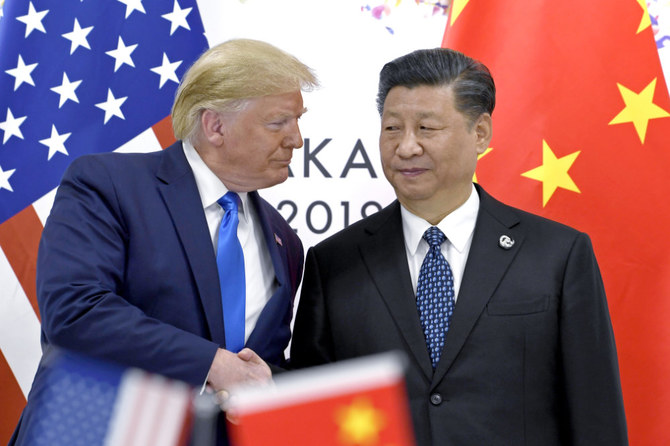
- Russia accused of acting against Biden, while China opposes Trump
- Trump claims Iran is also helping ensure he does not win a second term
Finance firms urge ambitious action on plastic pollution

- Curtailing the estimated 400 million metric tonnes of waste produced every year is a crucial part of efforts to protect biodiversity, with microplastics found everywhere from the mountainous Himalayas to staple foods and even human blood
LONDON: A group of 160 financial companies on Friday urged governments to agree a treaty to end plastic pollution that would help spur private sector action, ahead of the next round of global talks in Canada.
The fourth meeting of the Intergovernmental Negotiating Committee on Plastic Pollution (INC-4) is due to be held in Ottawa next week to lay the groundwork for an eventual deal before the end of the year.
Curtailing the estimated 400 million metric tonnes of waste produced every year is a crucial part of efforts to protect biodiversity, with microplastics found everywhere from the mountainous Himalayas to staple foods and even human blood.
To help fix the problem, the finance firms, which include Britain’s biggest investor Legal & General Investment Management and Canadian pension investor CDPQ, called for a policy framework backed up by binding rules.
Among specific steps, the group called for the treaty to set an objective for all public and private finance to be consistent with the goal of eliminating plastic pollution, similar to that in the Paris climate agreement and the Kunming-Montreal global biodiversity framework.
It also called for companies to assess and disclose plastic-related risks and opportunities; clearer plastic-related policies and targets from governments in areas like waste creating and recycling; and for further private investment to be directed to ending plastic pollution.
“A clear transition pathway laid out in the Treaty will help leverage finance at scale for this massive task of ending plastic pollution worldwide,” said Anne-Sophie Castelnau, global head of sustainability at ING, one of the signatories.
Steve Hardman, CEO of Plastic Collective, an NGO which designed the world’s first plastic waste reduction bond alongside Citi and the World Bank, welcomed the support but called for business to provide more financial solutions.
In January, the World Bank issued the $100 million bond to finance plastic-reduction projects in Ghana and Indonesia. Investors will be paid a rate linked to plastic removal credits generated by the projects.
Finnish PM: EU should help end migrant influx from Russia

- European Commission President Ursula von der Leyen visits the border to assess security situation
HELSINKI: The EU should take measures to help Finland stop an influx of migrants via Russia, Finnish Prime Minister Petteri Orpo said.
Finland last year shut its long border with Russia amid a growing number of arrivals from countries including Syria and Somalia.
It accused Moscow of weaponizing migration against the Nordic nation and the EU, an assertion the Kremlin denies.
Finland’s government has closed eight of its nine checkpoints with Russia.
The only one that remains open is dedicated to rail travel and cargo trains mainly run through it.
“We are preparing our legislation, but we also need EU measures,” Orpo said, without elaborating, after visiting the Nordic country’s border with European Commission President Ursula von der Leyen.
Von der Leyen told the same press conference that the EU Commission was working closely with the migrants’ countries of origin, agreeing with Finland’s position.
“What we see is that a state is instrumentalizing poor people to put pressure on another state, so that is a clear security issue,” she said.
She said that the measures taken to deal with migrants from Russia must balance protecting the security of borders and international obligations.
Following Poland and Lithuania’s example on their borders with Belarus, the Finnish government is drafting legislation allowing border guards to block asylum seekers entering the country from Russia.
“We all know how (Russian President Vladimir) Putin and his allies instrumentalize migrants to test our defenses and to try to destabilize us,” von der Leyen told officials.
“Now Putin is focusing on Finland, and this is no doubt in response to your firm support of Ukraine and your accession to NATO.”
Von der Leyen and Orpo flew in a Finnish helicopter over the landscape of forests and towns on the border.
Von der Leyen is campaigning as a conservative European People’s Party bloc member for a second term in office as head of the EU’s powerful executive branch.
Security is a top EPP theme before the June 6-9 European Parliament elections.
Most of the migrants hail from the Middle East and Africa.
Most of them have sought asylum in Finland, a member of the EU and NATO with a population of 5.6 million.
Finland joined NATO in April 2023, ending decades of neutrality after the country’s defeat by the Soviet Union in the Second World War.
In March, Sweden also became a member of the trans-Atlantic alliance.
The move dealt a major blow to Putin, with a historic realignment of Europe’s post-Cold War security landscape triggered by Moscow’s offensive against Ukraine.
US sanctions fundraisers for extremist West Bank settlers who commit violence against Palestinians

- Move comes as West Bank sees some of its worst violence perpetrated by settlers against Palestinians since Gaza war
WASHINGTON: The Biden administration on Friday imposed sanctions on two entities accused of fundraising for extremist Israel settlers already sanctioned, as well as the founder of an organization whose members regularly assault Palestinians.
The Treasury Department announcement comes as the West Bank has seen some of its worst violence perpetrated by extremist settlers against Palestinians since the war in nearby Gaza began.
There is also friction between President Joe Biden and Israeli Prime Minister Benjamin Netanyahu, whose far-right government has reacted angrily to previous sanctions imposed against West Bank settlers.
Included in the Friday sanctions are two entities — Mount Hebron Fund and Shlom Asiraich — accused of raising funds for sanctioned settlers Yinon Levi and David Chai Chasdai.
Both men were previously sanctioned by the Biden administration for violently attacking Palestinians in the West Bank.
The penalties aim to block them from using the US financial system and bar American citizens from dealing with them.
The fundraising campaign established by Mount Hebron Fund for Levi and by Shlom Asiraich for Chasdai generated the equivalent of $140,000 and $31,000, respectively, according to US Treasury.
In Levi’s case, the fund now sanctioned by the Biden administration is linked to the regional council in the area, a body that receives state money. The Biden order Friday stopped short of sanctioning the council itself.
Rights groups say that the expansion of illegal settler outposts in the West Bank is enthusiastically supported by the regional councils and nudged along by Israel’s current national government — the most far-right in the country’s history.
The Biden order also skirted sanctioning crowdfunding websites where funds were raised, GiveChak and New York-based Charidy.
In Chasdai’s case, the fundraiser on Charidy was organized by Shlom Asiraich, which raises money for imprisoned Jewish extremists.
Both online fundraisers have now been taken down. But at least one fundraiser linked to a settler previously sanctioned by the Biden administration, Moshe Sharvit, remains online. As of Friday, the page on GiveChak had raised the equivalent of over $879,000.
Additionally, the State Department is designating Ben-Zion Gopstein, the founder and leader of Lehava, an organization whose members have assaulted Palestinian civilians.
Treasury Deputy Secretary Wally Adeyemo said the organizations “undermine the peace, security, and stability of the West Bank. We will continue to use our tools to hold those responsible accountable.”
In February, Biden issued an executive order that targets Israeli settlers in the West Bank who have been accused of attacking Palestinians and Israeli peace activists in the occupied territory.
Hindu-Muslim divisions sway voting in Indian district scarred by deadly riots

- Villages are largely self-segregated by religion in and around Muzaffarnagar in the most populous Uttar Pradesh state
- Violent clashes broke out in 2013 after two Hindus stabbed Muslim youth to death, accusing him of harassing their sister
MUZAFFARNAGAR: Hindu-Muslim enmity made way for peace in an Indian district that saw deadly riots a decade ago but religious divisions still influence residents who voted on Friday in general elections in which Hindu nationalism is a key theme.
Villages are largely self-segregated by religion in and around Muzaffarnagar district, in the most populous northern state of Uttar Pradesh, but people say there is no longer tension between the majority Hindu and minority Muslim communities.
Violent clashes broke out here in 2013 after two Hindus stabbed a Muslim youth to death, accusing him of sexually harassing their sister. They were later beaten to death by a Muslim mob, which sparked riots that killed about 65 people, mostly Muslims, and displaced thousands.
Violence has not returned to the district known as the country's sugarcane-belt, but political divisions remain as Hindus typically vote for Prime Minister Narendra Modi's Bharatiya Janata Party (BJP) and Muslims for the opposition.
Modi's government has "controlled Muslims", said Ramesh Chand, a Hindu biscuit baker in Kairana city near Muzaffarnagar.
Critics accuse the nationalist BJP of targeting India's 200 million minority Muslims to please their hardline Hindu base - charges they deny.
Modi is widely expected to win a third term on the back of strong growth, welfare and his personal popularity despite some concern about unemployment, price rises and rural distress.
Chand said Modi had improved security in the region. "We can live in peace, whether or not we have jobs ... We can sleep with our doors open."
There were opposing views too.
In Jaula village, sugarcane farmer Mohammed Irfan, 50, said Modi's "high-handedness against Muslims" as well as unemployment and inflation were major reasons for him voting for the opposition Samajwadi Party.
Uttar Pradesh elects 80 lawmakers to the 543-member lower house of parliament, the most among all states, and a strong showing here is critical to the nationwide outcome.
Support for Modi was visible in Kutba Kutbi village, the epicentre of the 2013 riots.
Although there is "brotherhood" between the two communities now, nearly all Muslim families left the village after the riots, said Vinay Kumar Baliyan, 43, a farmer who said he supports Modi for promoting economic growth and raising India's stature globally.
But Irfan said Muslims are expected to vote in larger numbers this time as Eid celebrations this month brought many migrant workers and students home.
After Pakistan alert, WHO likely to issue wider warning on contaminated J&J cough syrup

- The UN health body said it puts out global medical product alerts to ‘encourage diligence’ by authorities
- The WHO this week sent out alert on five batches of contaminated cough syrup ingredients found in Pakistan
LONDON: The World Health Organization is likely to issue a wider warning about contaminated Johnson and Johnson-made children’s cough syrup found in Nigeria last week, it said in an email.
Nigeria’s regulator recalled a batch of Benylin paediatric syrup last Wednesday, having found a high level of diethylene glycol in the product during routine testing.
The contaminant, alongside another closely related toxin, ethylene glycol, has been linked to the deaths of more than 300 children in Cameroon, Gambia, Indonesia and Uzbekistan since 2022, though there is no evidence that these incidents are linked with the latest recalls.
The UN health body said it puts out global medical product alerts to “encourage diligence” by national authorities and was likely to do so in this instance, “subject to confirmation of certain details from parties.”
The recalled batch of Benylin syrup was made by J&J in South Africa in May 2021, although Kenvue now owns the brand after a spin-off from J&J last year.
J&J has referred requests for comment to Kenvue. In an emailed statement on Friday, Kenvue said it had carried out tests on the batch recalled by Nigeria and had not detected either diethylene or ethylene glycol.
“We continue to work closely with health authorities and the WHO and are engaging with NAFDAC to understand their test results, including verifying the authenticity of the sampled product, the testing methodology used, and results reported by the agency,” the statement added.
Since Nigeria’s recall, five other African countries have also pulled the product from shelves — Kenya, Rwanda, Tanzania, Zimbabwe and South Africa, where the drug was made.
South Africa’s regulator has also recalled another batch of the syrup, which is used to treat coughs, hay fever and other allergic reactions in children.
Diethylene glycol is toxic to humans when consumed and can result in acute kidney failure, although there have been no reports of harm in the latest incident.
RAW MATERIALS
In the 2022 cases, the contamination in the syrups came from the raw materials used by manufacturers in India and Indonesia.
The WHO said it was collaborating with both the manufacturer and regulatory authority in South Africa to investigate the Benylin paediatric syrup, and had information on the source of the ingredients used. Kenvue has previously said it tested its ingredients before manufacture.
The agency said the possibility that the syrup was counterfeit was also “under consideration as part of investigations.”
Earlier this week the WHO sent out a separate alert on five batches of contaminated cough syrup ingredients found in Pakistan that appeared to have been falsely labelled as Dow Chemical products.
It was the first alert the WHO has sent on excipients — elements of a medicine other than the active pharmaceutical ingredient — rather than finished products, the agency confirmed on Friday.
The batches of propylene glycol were contaminated with ethylene glycol.
“It was critical for WHO to also alert manufacturers that may have been procuring this material to exercise more caution,” a WHO spokesperson said by email.
Propylene glycol is not an ingredient in Benylin paediatric syrup, a Kenvue spokesperson said on Friday.




